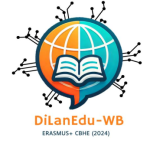Current projects:
University Mediterranean is currently participating in the following projects:
DiLanEdu-WB
Digital Transformation in Language Study and Education in the WB
ERASMUS+ CBHE (2024) Project No. 101179642
link
In the Digital Age, as children spend increasingly more time in the digital world at the expense of time spent in physical interaction with other children, digitalization of language instruction is imperative to improve oral communication, language skills and reduce anxiety in speaking tasks. The necessity to integrate digital methods and tools in language education and study has been identified in the West Balkans, where strategies have been developed for digital transformation setting digital competencies as a primary aim in the transformation of their educational systems. Common issues identified therein include the inadequate qualification of teachers, including language teachers, to integrate digital tools and methods in the teaching and learning process, as well as the absence of adequate digital content in WB languages.
Hereupon, this project aims to improve the quality of language education in the WB Higher Education Area by stren thening the participating HEI language teacher-training curricula with ICTs. The project will also establish and operationalize specialized laboratories. The particular objectives of the project are as follows:
- The updating and enhancing existing curricula to incorporate digital methods and tools in language teaching, learning and research in new & innovative transformations of older disciplines (e.g., computational linguistics) and the development of new micro credentials training programmes for pre-university education teachers in the same discipline.
- The establishment or enhancement of specialized laboratories of digital methods and tools in language teaching, learning and research.
- The establishment of a network of institutions and individuals sharing similar interests in using and promoting digital tools in language teaching & learning, as well as in linguistic scientific research.
The project will thus develop capacities in the following three directions:
- Digital Language Education.
- Instruction of language skills & intercultural skills in a digital environment.
- Digital transformation in discourse & linguistic analysis.
Project Partners
- Logos University College, Albania, Coordinator.
- University of Tirana, Albania, Partner.
- "Eqrem Çabej" University of Gjirokastrër, Albania, Partner.
- University of Banja Luka, Bosnia & Herzegovina, Partner.
- University of Sarajevo, Bosnia & Herzegovina, Partner
- University of Prishtina, Kosovo, Partner.
- “Isa Boletini” University of Mitrovica, Kosov, Partner.
- Mediterranean University of Podgorica, Montenegro Partner.
- University of Western Macedonia, Greece, Partner.
- OTTO-VON-GUERICKE University of Magdeburg, Germany, Partner.
- British School of Tirana, Albania, associated partner.
- Faik Konica School, Kosovo, associated partner.
- “Trol” Nursery School, Bosnia & Herzegovina, associated partner.
- “Miloje Dobrasinovic” High School, Montenegro, associated partner.
- TESSERA Information Systems Ltd., Greece, associated partner.
Project Duration: 36 months.

CSupMNE
Straightening Up Cybersecurity Posture of Montenegrin Higher Education system
The CSupMNE Erasmus+ project is designed to implement sustainable systemic and structural reforms and modernization of the Montenegrin higher education system (MNE), aimed at assessing, protecting and managing the growing business risks and threats in the digital world. The project will help protect staff, students and partners during their stay in higher education institutions.
Project sub-goals:
- Increasing cyber threat awareness and capacity building at all levels of the higher education system.
- Improving the quality of education through the adoption of accreditation standards for digital education and modernization of programs in the field of cyber security.
- Reform the operating model of higher education at the national level to proactively identify and address business risks from cyber threats, through the introduction of a cyber security framework.
- Significant changes in the infrastructure of higher education through innovative technological solutions to reduce the number and limit the effects of cyber attacks.
- Building capacities and mechanisms for appropriate response and recovery from cyber incidents through the establishment of an MNE academic CSIRT.
Key indicators: 1 MNE academic CSIRT, 4 CS groups with 55 trained members, 5 training modules, 16 training events for management, academic and non-academic staff, and 5200 students.
It is planned that the project will last 3 years, from the beginning of 2025 to the end of 2027.
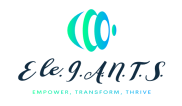
ELEGANTS
E-Learning Gamified and Networked Training for Startupper
The general goal of the project is to increase the innovation capacity of students trained in higher education institutions in the field of culture and art, in the design and implementation of sustainable enterprises and circular economy through the improvement of teaching skills, strengthening of digital, green and entrepreneurial skills. To face the challenges related to the lack of skills in digital methods and their use, the project will therefore develop curricula and training programs of higher education institutions in the field of arts and culture, adapting them to target groups on issues that aim to create new forms of expression and enjoyment of arts and culture and their translation into business opportunities. All this in accordance with the implementation of European strategic cooperation in the field of education and training, enabling the involved higher education institutions to increase the quality and relevance of their activities, to develop and strengthen their partner networks, to increase their capacity to work together at the transnational level, favoring the internationalization of activities, exchange and the development of new practices and methods, as well as the exchange and comparison of ideas.

DIGITCRESHE
DIGITAL TRANSFORMATION IN EDUCATION FOR THE CULTURAL AND CREATIVE INDUSTRIES
The focus of the project corresponds to the call and priorities of the region related to digital transformation, namely developing and implementing digital education strategies, strengthening programs that cover digital skills, assisting in teacher training and online educational learning while making digital transformation as comprehensive and inclusive as possible. In this way, the project also addresses the Green Deal priority of increasing the region's competitiveness and stimulating green jobs by guaranteeing that students are equipped and prepared for the labor market and society of tomorrow. Therefore, the response to the priority Sustainable growth and jobs by solving the challenges associated with the skills mismatch between education outcomes and labor market requirements. The project closely addresses the following objectives:
- Transfer of their teaching and research results to the community/country.
- Increased participation of higher education institutions located in remote areas.
- Regional integration and establishment of comparable tools to support academic cooperation, mobility of students, staff and researchers.
- Stronger connection and cooperation with the private sector, promoting innovation and entrepreneurship.
- Coordinating the academic world with the labor market by increasing the employability of students.
- Increased level of digital competence for students and staff.
- Institutional ownership of CBHE results in ensuring sustainability.
- State ownership through experimentation and introduction of positive and best practices in higher education.

IOT-ECO
IOT GREEN TRANSFORMATION FOR ACADEMIC SOCIETY AND BUSINESS ORIENTED ECOSYSTEM IN WESTERN BALKANS
IoT-ECO focuses on building capacity, fostering innovation and facilitating regional cooperation. Our vision is to create an innovative ecosystem within each VZ of the SB, using IoT/IoE solutions to address the specific needs of sectors such as agriculture, tourism and energy. The project extends beyond academia, including associated partners — an innovation fund, a port and an ICT company — to model a business-oriented innovation ecosystem.
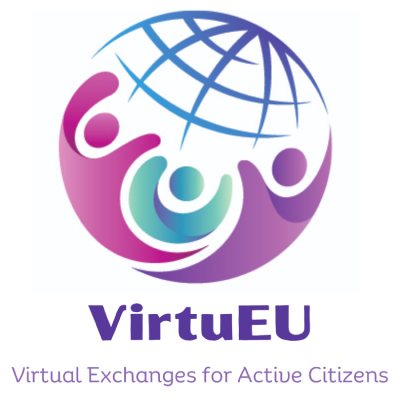
VirtuEU
IOT GREEN TRANSFORMATION FOR ACADEMIC SOCIETY AND BUSINESS ORIENTED ECOSYSTEM IN WESTERN BALKANS
VirtuEu is a virtual exchange program that unites young people across borders, ensuring inclusivity by overcoming barriers that could hinder participation. It aims to engage over 2,500 students of higher education institutions (HEIs) from EU member states and Western Balkan countries in activities that will promote active citizenship and civic participation. We believe that by working together, sharing insights and learning from each other, we can achieve greater impact than any of us could alone. Our project is built on the foundations of mutual respect, open communication and a shared commitment to empowering the target group and increasing its civic participation.

CRED4TEACH
MOOC-BASED MICRO-CREDENTIALS FOR TEACHER PROFESSIONAL DEVELOPMENT
The CRED4TEACH project responds to the needs of higher education institutions and educational decision makers in target countries Albania, Montenegro and Ukraine towards providing high-quality, responsive, inclusive, flexible and competence-based training provisions to in-service teachers across the educational sectors. The project’s solution is to establish the MOOC-based micro-credentials for enhancing the opportunities for teacher professional development in target countries. The project objectives are:
- to boost staff skills for the development and delivery of MOOC-based Micro-credentials;
- to develop and introduce national and institutional frameworks for the delivery, issuing and recognition of Micro-credentials,
- to create, deliver and validate 11 pilot MOOC-based Micro-credentials,
- to encourage the wider adoption of Micro-credentials for professional development of teachers and other target groups.
To achieve the project objectives, CRED4TEACH partnership will:
- upskill teaching and administrative staff from participating partner institutions to MOOC (Massive Open Online Courses) and micro-credential designers;
- create national and institutional guidelines for offering and validating micro-credentials,
- design, deliver and validate 11 pilot micro-credentials using MOOC approach
- promote the achieved results through a large-scale dissemination campaign.
The expected results of the project are:
- 46 teaching and administrative staff members upskilled to micro-credentials and MOOC-designers;
- 11 MOOC-based micro-credentials, each between 4-6 ECTS, delivered to at least 220 pilot teachers from Albania, Montenegro and Ukraine;
- 3 national and 8 institutional frameworks on the provision and recognition of micro-credentials for teachers;
- 3 national blueprints on adoption of micro-credentials.
CRED4TEACH partnership covers 15 institutions from 7 countries, which are Albania, Estonia, Germany, Montenegro, Portugal, Türkiye, and Ukraine:
- Fachhochschule des Mittelstandes (Bielefeld, Germany)
- Universidade Aberta (Lisboa, Portugal)
- Tallinn University (Tallinn, Estonia)
- Anadolu University (Eskisehir, Türkiye)
- Ukrainian Engineering Pedagogics Academy (Kharkiv, Ukraine)
- Cherkasy State Technological University (Cherkasy, Ukraine)
- Bogdan Khmelnitsky Melitopol State Pedagogical University (Melitopol, Ukraine)
- Drohobych Ivan Franko State Pedagogical University (Drohobych, Ukraine)
- National Qualifications Agency (Kyiv,Ukraine)
- Universitetit te Vlores (Vlore, Albania)
- Universeti Shkodres Luigj Gurakuqi (Shkodre, Albania)
- Agjencia e Sigurimit te Cilesise se Arsimit Parauniversitar (Tirana, Albania)
- Univerzitet Mediteran Podgorica Privatna Ustanova (Podgorica, Montenegro)
- Javna Ustanova Univerzitet Crne Gore Podgorica (Podgorica, Montenegro)
- Agencija Za Kontrolu I Obezbjedenje kvaliteta Visokog Obrazovanja (Podgorica, Montenegro).
The project is being coordinated by Fachhochschule des Mittelstandes (Bielefeld, Germany), www.fh-mittelstand.de
Coordinator contact:
Ms Olga Zubikova, project coordinator: olga.zubikova@fh-mittelstand.de
Mr Sascha Lord, scientific head of the project: sascha.lord@fh-mittelstand.de
Project lifetime: June 1, 2023 – May 31, 2026 (36 months)
Awarded grant: 700 193,00 EUR
 |
Funded by the European Union. Views and opinions expressed are however those of the authors only and do not necessarily reflect those of the European Union or the European Education and Culture Executive Agency (EACEA). Neither the European Union nor the European Education and Culture Executive Agency (EACEA) can be held responsible for them. |
Finished projects
University Mediterranean Podgorici has been involved in following projects
Finished Projects:
ROAMING
Strengthening International Staff & Student Mobility Offices in the West Balkans
This project responds to the European Commission’s commitment to reinforce ERASMUS+ programme “in particular by reaching out to increasing numbers of people with fewer opportunities,” as those served by theHEIs. The project, titled “ROAMING – Strengthening International Staff & Student Mobility Offices in the West Balkans,” aims at reducing the unbalanced international mobility uptake of remote and less privileged HEIs in the West Balkans by strengthening the capacity of their International Relations Offices. To this end, we are working to establish a consortium with a mix of experienced and inexperienced Higher Education Institutions from the West Balkans in matters related to ERASMUS+ from Albania, Kosovo* and Montenegro, willing to cooperate with an experienced university from an ERASMUS member country and another university from an associated country, North Macedonia.
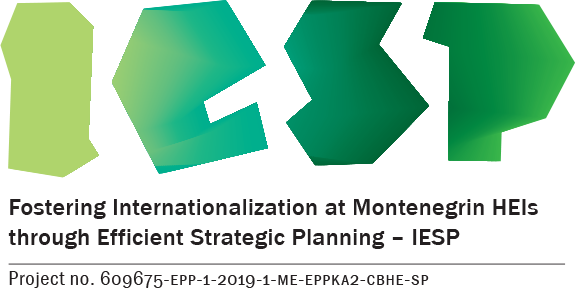
IESP
Fostering Internationalization at Montenegrin HEIs through Efficient Strategic Planning (IESP)
The IESP project aims to improve the international competitiveness of Montenegrin universities that are participants in the project, primarily by providing the best model of capacity building for various aspects of internationalization. The purpose of the implementation of the project is to overcome the shortcomings that, in the field of internationalization of higher education institutions in Montenegro, were pointed out by international experts in their reports from 2018, within the framework of the Institutional Evaluation Program (EUA IEP).
The specific objectives of the project will be realized through several key tasks, which include:
- identification of different models of internationalization at partner universities from the European Union and development of guidelines for an effective model of internationalization at universities in Montenegro;
- development of capacities for participation in the internationalization process through staff training and equipment modernization;
- the development of the necessary tools to strengthen the internationalization process, which include the development of an internationalization strategy with an action plan and accompanying documents, the introduction of teaching in English in selected subjects at the level of undergraduate and master's studies and the development of teaching materials in English, the organization of accredited interdisciplinary summer schools in English, development of criteria for assessing the quality of the internationalization process and establishment of the Language Center for Internationalization at the University level.

BKSTONE
Higher Education–Enterprise platform for fostering, modernisation and sustainable growth in natural stone industry in Western Balkans
The main goal of the project is to encourage the modernization and development of the stone industry in the partner countries of the Western Balkans and to strengthen the relationship between higher education and industry.
For this purpose, the project has been assigned various specific objectives:
− Benchmark existing training initiatives and include elements in project training results;
− To support technological and practice-based innovative training based on the approach and format of the courses;
− To encourage the participation of interested parties in the industry in the stages of conception and examination of the results;
− Testing of new higher education opportunities at tertiary levels of professional education in partner countries;
− Contributing to national / regional innovation strategies for specialization in the natural stone sector with project outputs;
Create a Stone Sector network platform that includes stakeholders in program and partner countries;
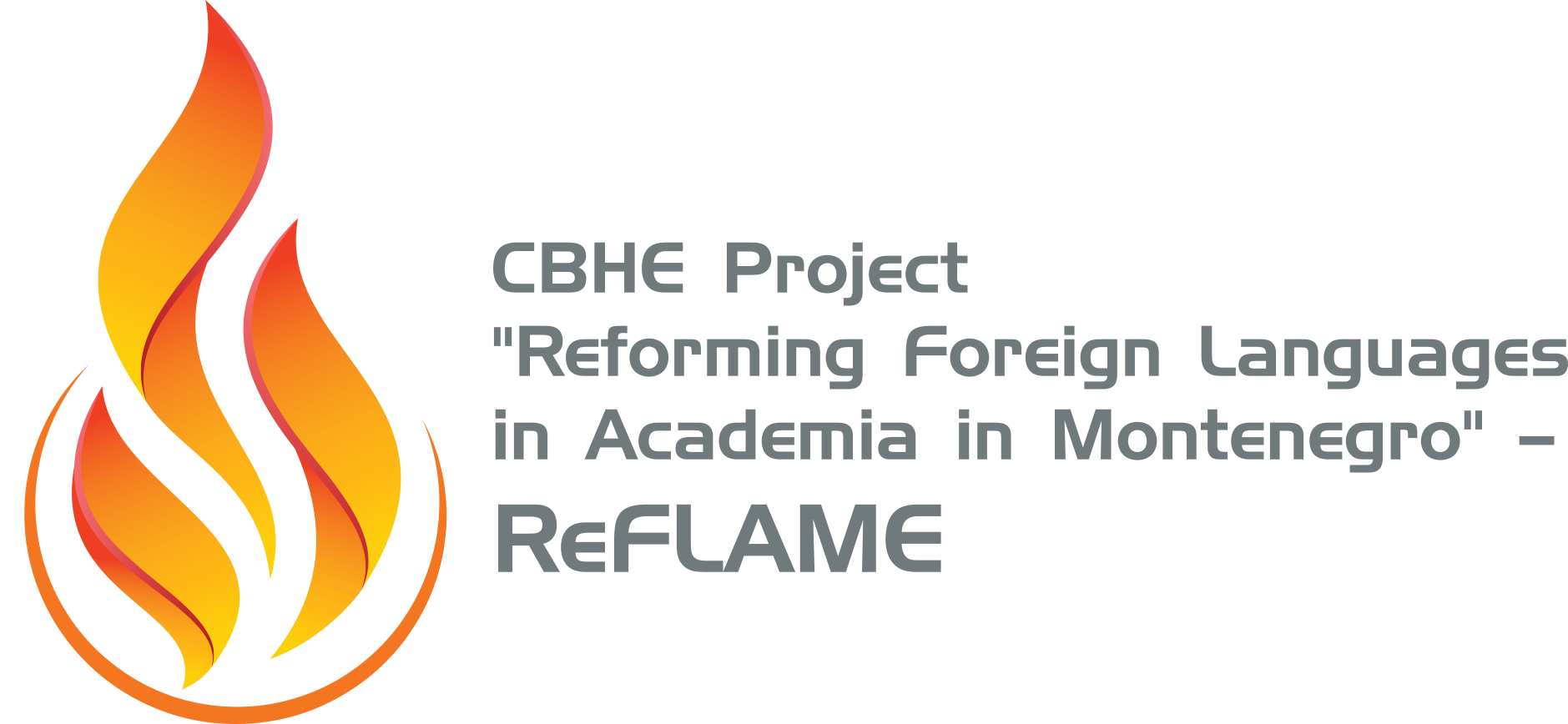
REFLAME
Reforming Foreign Languages in Academia in Montenegro – ReFLAME
https://www.reflame.ucg.ac.me/
The ReFlame project will deal with the reform of foreign language curricula in higher education in Montenegro, and will last a total of three years. The coordinator of the project is the Faculty of Philology, and the project partners are the Montenegrin University of Donja Gorica and the University of the Mediterranean, as well as three partner institutions from the EU - the University for Foreigners in Perugia, the University of Warsaw and the University of Zagreb, which will provide expert support in the field of professional language teaching.
The goal of the project is to strengthen the capacities and mutual and international cooperation of the three mentioned Montenegrin universities in terms of offering modern and market-oriented foreign language teaching at non-native faculties, and strengthening the teaching of a second foreign language at all faculties in response to the growing need for young experts in all fields to know as many foreign languages as possible.

